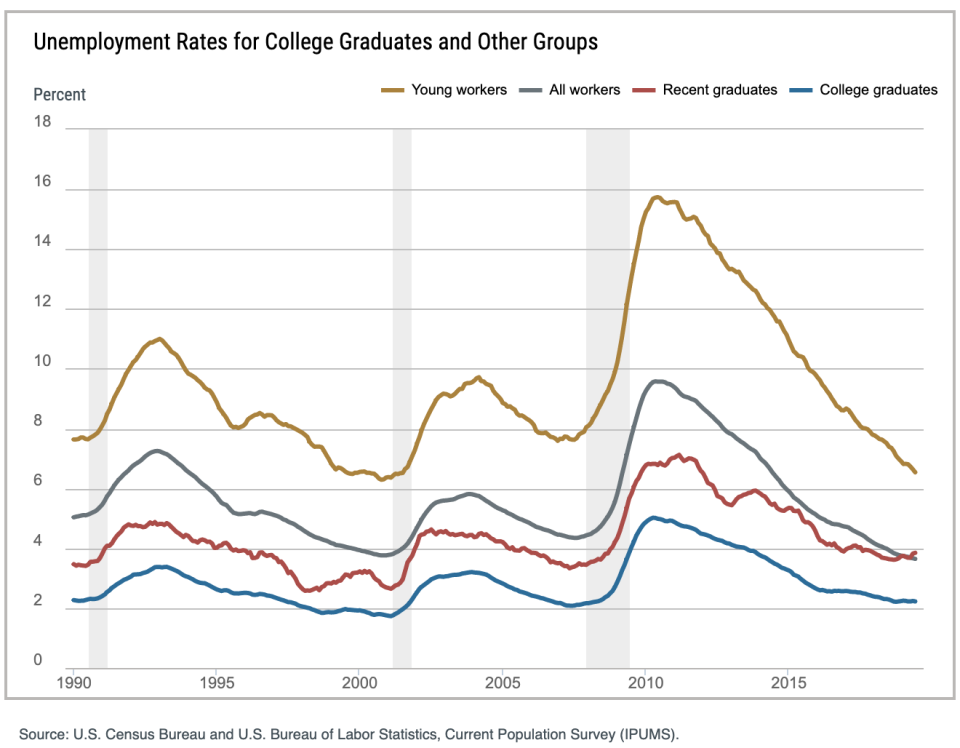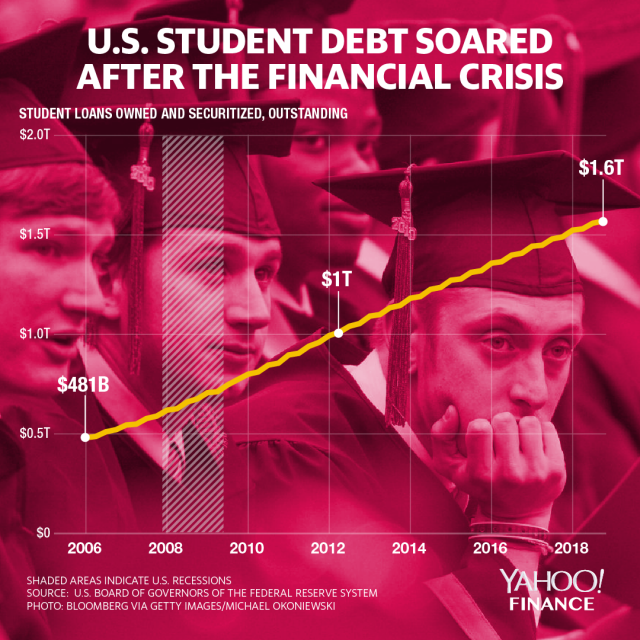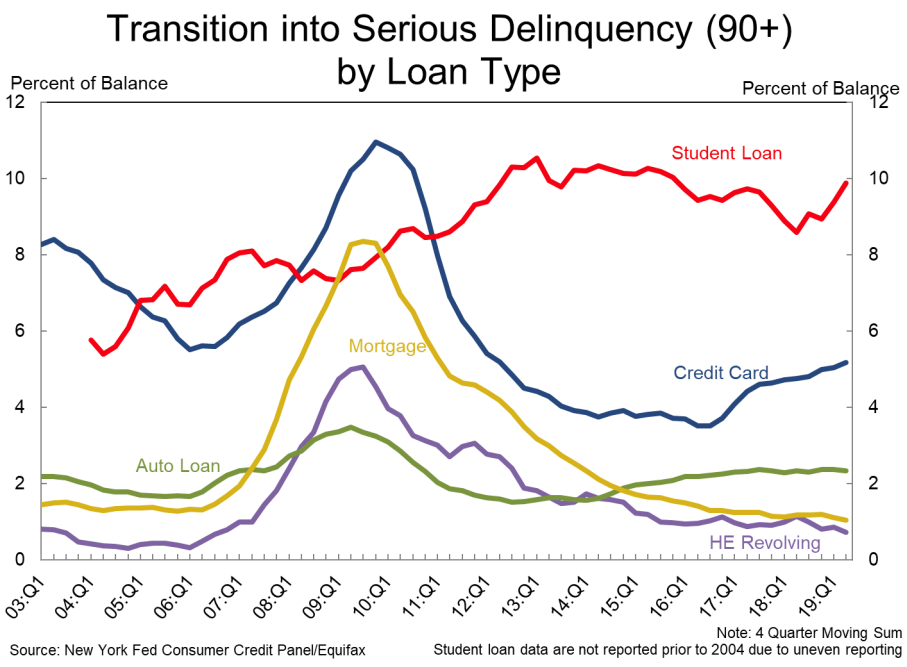Fresh college graduates face a 'concerning' labor trend
New data from the New York Fed reveals that the unemployment rate for recent graduates actually rose in the second quarter of 2019.
The upward tick, noted by DataTrek Research, stated that for “the first time ever, recent college graduates are more likely unemployed than the base U.S. population.”
The data goes back to 1990, as seen on the chart below:

‘Concerning’ unemployment rate rise for recent graduates
The report noted that while unemployment rates for all college graduates aged up to 65 and young workers without a bachelor’s were at the lowest levels of the current cycle, the market for recent graduates bucked that trend.
The rise in unemployment for recent grads at the same time is “concerning” the report says, “especially since it never got back to prior cycle lows.”
The rates are calculated as a 12-month moving average. Recent college graduates are defined as those between the ages of 22 and 27 with a bachelor’s degree or higher.
The graphic above shows how the unemployment trend for recent college graduates (red line) has been volatile for the past few months and finally surpassed the unemployment rate for all workers around graduation time in May 2019.
That month, the unemployment rate for all workers remained the same at 3.7%, but the rate for recent graduates rose to 3.8%. In June, the unemployment rate for all workers fell to 3.6%, but for recent grads stayed the same at 3.8%.
The unemployment rate for recent graduates was 2.58% in February 1998 and 3.33% in May 2007, DataTrek noted. It reached a low for the post-Great Recession cycle of 3.62% in September 2018, and has since been rising higher.

‘Hiring has slowed noticeably’
The most likely reason for this trend is because of firms pulling back on spending, economists told Yahoo Finance.
Noting that the data is not seasonally adjusted, RSM Chief Economist Joe Brusuelas said that “hiring has slowed noticeably over the past year, and through the end of July… [and] in terms of recent graduates, there’s a slower pace of hiring out of the gate.”
Moody's Analytics Chief Economist Mark Zandi concurred: “It likely reflects in part greater caution by businesses given the slowing economy and uncertainty created by the trade war.” Zandi also added that the series was “volatile” as “it is based on a small sample and likely overstates the weakness.”
Another reason why recent graduates in particular — and not college graduates overall — were affected also had to do with a lack of experience, Brusuelas added.
Hi everyone. I just graduated with my Bachelor’s degree, but I haven’t had any luck with getting a job. I search and apply but don’t get selected. It’s discouraging, but I keep trying. pic.twitter.com/YURqkQwcED
— salty. (@onnamyrtle) August 17, 2019
‘Steady drop’ in unemployment for young workers without college degree
Meanwhile, more young workers without a college degree are being pulled into the labor force, which has resulted in a “steady drop” in unemployment and is “reflective of a robust economy,” the report stated.
“The unemployment rate for young workers without a bachelor’s degree continues to fall to the lows of the early 2000s, pulling the rate for all workers down with it amid a relatively flat but low unemployment rate for working aged college graduates,” the report said.

‘This cohort could get hit hard’
The current trend — if it persists — could lead to borrowers facing even more financial pressure.
DataTrek said was that while the unemployment rate for recent graduates have been ticking higher the last few months, for many of these graduates entering the workforce with heavy student debt burdens, this could be challenging, and “this cohort could get hit hard in the next recession.”
Especially since recent graduates are holding $1.48 trillion in outstanding student loans.
A separate report by the New York Fed noted that a large number of those loans were turning sour: “[I]n the second quarter of this year, the outstanding severely derogatory balance is comprised of 35 percent defaulted student loans, which have grown stunningly since 2012.”

Given the trend, “you wait six to 12 months, and you’re going to have an increase in delinquencies on student loans and potential defaults 12 to 18 months faster,” Brusuelas added.
Nonetheless, there was no immediate cause for concern, Zandi and Brusuelas concluded.
“It is too soon to explicitly state that the labor market has turned and unemployment for recent graduates is unambiguously going to increase,” Brusuelas.
And in any case, rising unemployment leading to increasing defaults on student loans wasn’t going to topple the economy, Brusuelas added.
“It won’t affect the economy — that’s a problem for the federal government.”
—
Aarthi is a writer for Yahoo Finance. Follow her on Twitter @aarthiswami.
Read more:
'Severely derogatory': U.S. student debt defaults have 'grown stunningly'
Dimon: U.S. student loan debt is ‘now starting to affect the economy’
Read the latest financial and business news from Yahoo Finance
Follow Yahoo Finance on Twitter, Facebook, Instagram, Flipboard, SmartNews, LinkedIn,YouTube, and reddit.

